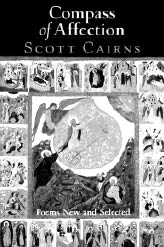Compass of Affection by Scott Cairns
by Tony Leuzzi

(Paraclete Press, 2006)
In a famous miniature from an early 13th-century Old French Bible, God bends before the world—which he holds in his left hand—and a large gold compass—which he holds in his right. This image of God as architect is the iconic reference for Compass of Affection, Scott Cairns’s new and selected poems. A writer of depth and range, Cairns crafts poems of faith in an age when readers are liable to greet the subject with cynicism. However, Cairns is neither prescriptive nor naïve. Sampling his strongest verse from The Theology of Doubt onward, Compass supercedes his previous new-and-selected collection, 2002’s Philokalia. And although Compass omits a handful of gems from the former book, it is definitely worth getting. Indeed, some of Cairns’s most moving statements emerge from his 27 new poems. If the spiritual bankruptcy of consumerist culture seems an easy target for any poet, Cairns articulates the issue (in “Late Apocalypse”) with stunning originality: “The world—impossible conceit—/ dwindles in its substance even as its matter flourishes,/ and those who might direct it otherwise would be the last/ to jimmy up the works…” In “Trouble” a parent who has put his children to bed considers an unnamed terror that lies beyond that poem’s terminal ellipses. And in “Setting Out” “the slowest pilgrim” eventually forgoes the musty comforts of the hut for the uncertainty of the open road. Equally impressive are Cairns’s translations of poems from modern Greek masters Elytis, Kavafy and Seferis. But for me the most moving poems are those that reaffirm his disciplined religiosity. The third-to-last poem, “Evening Prayer,” begins with a question: “And what would you pray in the troubled midst/ of this our circular confusion…” The question, which remains unanswered, informs so much of Cairns’s work. And for anyone who believes the creation of the world is beyond the limits of our understanding, it’s a question we must never stop asking.
|
Issue Navigation> Issue Index > v5n51: Bye-Bye Skyway (12/21/06) > Compass of Affection by Scott Cairns This Week's Issue • Artvoice Daily • Artvoice TV • Events Calendar • Classifieds |









 Current Issue
Current Issue